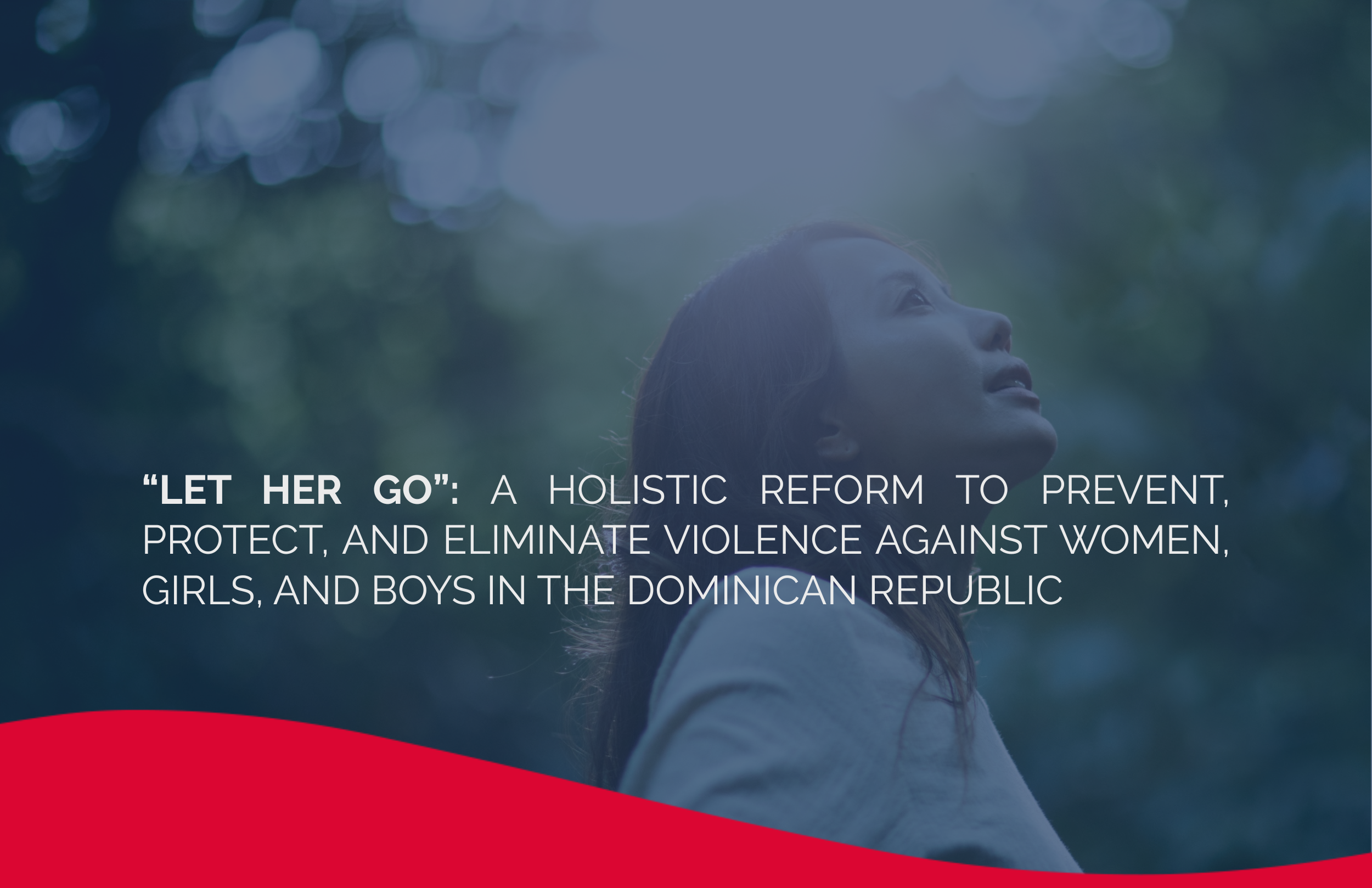
“Let Her Go”: A Holistic Reform to Prevent, Protect, and Eliminate Violence against Women, Girls, and Boys in the Dominican Republic
The “Let Her Go” initiative emerges as a State strategy that integrates legislative action, public communication, and community mobilization. Its purpose is to decisively confront violence against women, girls, boys, and adolescents by means of a reform package capable of transforming prevention, protection and criminal prosecution throughout the country.
Its core objective is both ambitious and measurable: to reduce femicides by 30% by the year 2030 and to eradicate them entirely by 2035 — a goal set forth under the so-called 30/30 Strategy. It provides for a progressive decrease in cases, reducing the current figure of approximately 120 femicides per year to 60 in 2027, 30 in 2030, and their complete elimination within the established timeline.
-
Nature of the Initiative and National Scope
“Let Her Go” is a comprehensive reform, submitted by Congresswoman Kimberly Taveras Duarte, conceived as a national pact for life aimed at ensuring equality, justice, and effective protection. It does not limit itself to the introduction of legislative bills, but rather constitutes a strategic framework composed of 18 coordinated initiatives intended to address the structural causes of violence, strengthen institutions, and provide real and effective solutions for victims.
It also represents an inter-institutional effort supported by the Senate, the Chamber of Deputies, municipalities, the business sector, government agencies, and community groups. The proposal was formally launched during a special session of the National Assembly, presided over by the President of the Senate, Ricardo de los Santos, in the company of legislators and civil and military authorities.
-
Strategic Pillars of the Reform
The set of bills that comprise “Let Her Go” is structured around three major pillars that guide the public policies arising from the reform:
a) Prevention
Aimed at identifying and stopping violence before it occurs through education, community programs, employment policies, and cultural transformation.
b) Protection
Strengthening safeguarding mechanisms for victims, minors, single mothers, and women at risk, offering safe spaces, economic support, and comprehensive assistance.
c) Prosecution
Modernizing, tightening, and improving the efficiency of the criminal justice system to ensure timely responses, effective sanctions, and technological mechanisms to monitor aggressors.
-
Proponents and the Role of the National Congress
The reform counts with the sponsorship of more than 70 female legislators, both Deputies and Senators — one of the most extensive and cohesive legislative efforts in the recent history of the country on matters of rights and protection.
Key proponents include Kimberly Taveras, Brenda Ogando, Soraya Suárez, Margarita Tejeda, Aracelis Villanueva, among many others, who have emphasized that this proposal not only legislates, but also mobilizes, educates, and drives transformation.
The President of the Senate, Ricardo de los Santos, stressed that this is a “State and society pact,” designed to unify efforts to change mindsets, confront violence, and protect all citizens, particularly the most vulnerable.
-
The 18 Legislative Bills that Make Up “Let Her Go”
Below is an organized summary of the 18 bills included in the comprehensive reform, classified by purpose:
A. Framework and Institutional Bills
Framework Law “Let Her Go” – Strategy 2030–2035 and SINAPREP
Proponents: Kimberly Taveras, Carolin Mercedes. Defines the overarching strategy, establishes the National Prevention System, and the institutional coordination framework.
B. Prevention
-
Comprehensive System for Equality and Non-Discrimination in Employment and Education (ONFIS) — Kimberly Taveras
-
Amendment to Law 33-18 on Political Gender Violence — Soraya Suárez
-
Amendment to Law 53-07 on Digital Violence — Ycelmary Brito O’Neal
-
Amendment to Law 66-97: equality in the education system, social workers, positive masculinities — Several Deputies
-
National Economic Empowerment Program for Women (PNPEMV) — Brenda Ogando
-
National Care System — Aracelis Villanueva
-
Mandatory Accountability Programs and Dual Centers — Darwellys D’Aza
-
“Mother S-F” Subsidy for Single Mothers in Border Areas — Daritza Zapata Díaz
C. Protection
-
National System for the Integral Protection of Minors (SNPIVEF) — Margarita Tejeda
-
Shelters and Comprehensive Empowerment Centers (Law 88-03) — Monserrat Santana, Tayluma Calderón
-
Municipal Victim Assistance Units (Amendment to Law 176-07) — María Ortiz
-
Enhanced Protection for Minors (loss of parental authority for femicide perpetrators) — Olfanny Méndez
D. Prosecution
-
Telematic Monitoring System (electronic bracelets) and 24/7 Centers — Leyvi Bautista
-
Amendment to Law 137-03 on Human Trafficking — Ydenia Doñé, Ycelmary Brito, Liz Mieses
-
Specialized Jurisdiction on Gender Violence — Jacqueline Fernández and others
-
Comprehensive Law on Repeat Aggressors (RUAVID-R, COVAV, disarmament measures) — Carmen Ligia Barceló, Liz Mieses
-
Institutional Reform in the Armed Forces and National Police (arms control and permits) — Dilenia de los Santos
-
Social and Communications Dimension of the Initiative
“Let Her Go” is not solely a legislative reform: it also constitutes a national awareness campaign based on visible symbols and targeted community actions. It includes:
-
the use of purple scarves on legislative seats;
-
mass media campaigns;
-
educational activities in provinces with high femicide rates;
-
active presence of female legislators at the community level to bring the message directly to citizens.
This component seeks to unite the State and society in a common cause: the protection of the life and dignity of women and children.
-
A National Call for Unity and Hope
In the words of the President of the Senate: “Protecting women and children is protecting the country.”
And as Kimberly Taveras concluded: “Let Her Go transforms pain into hope, outrage into action, and violence into prevention.”
This initiative constitutes a decisive step toward a nation where every person can live free from violence, in full equality of rights and with institutions capable of providing real and timely responses.